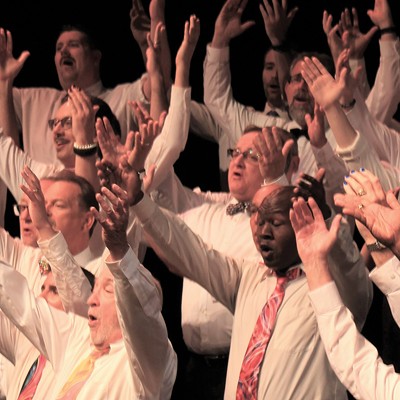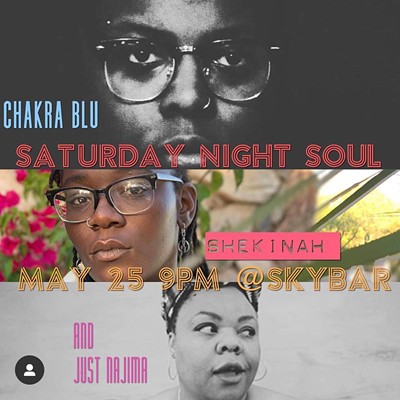If there's a soul revival going down ... is the unfortunate implication that real soul music needed to be revived? Was it on life support, requiring resuscitation and in danger of fading away?
Let's ask members of two excellent bands, which are bringing the funk and R&B grooves to Tucson venues during the same week.
"Definitely in the part of the country where we live, that traditional soul sound is something that has never gone away," says Scott Bomar, bandleader and bassist for the Memphis-based band The Bo-Keys, which will play Tuesday, Nov. 8, at the Rialto Theatre.
"It's something I don't ever remember not hearing, whether it's on the radio or in the clubs on Beale Street, or being DJ'd in a juke joint. I always remember hearing that sound," he says.
But it's all subjective, Bomar adds. For years, he and his bandmates have been playing blues-based soul in the style of vintage Stax and Volt artists.
"The success of Amy Winehouse, Sharon Jones, Raphael Saadiq and some others has all played into the taste of people who have always loved the real soul music of the 1960s and '70s. So if you were into the stuff, it's always been there. But I meet people who are younger than you and me, and they don't know who Otis Redding was. It sounds kind of bizarre, I know. But for people who were born in the 1980s and '90s, they might need an introduction to the music."
Which is what The Bo-Keys aim to provide. Bomar says his mission upon forming the band had two parts.
"The first reason is a selfish reason, and it's about how much I enjoy playing this music. The second was to give a forum for a lot of these guys who played during what I call the golden age of Memphis music."
First assembled in 1998, The Bo-Keys have attracted members such as guitarist Charles "Skip" Pitts (who has played with Rufus Thomas and the Isley Brothers, and on Isaac Hayes' "Theme From Shaft"), trumpeter and vocalist Ben Cauley (Otis Redding, The Bar-Kays) and drummer Howard Grimes (Al Green, Ann Peebles and many sessions for producer Willie Mitchell). Horn-players Marc Franklin and Jim Spake also are both veterans of the bands of Al Green and Bobby "Blue" Bland.
"It was sad to me and a travesty that these guys were not playing many recording sessions and gigs, when they still sound as good as, if not better than, they did in the 1960s and '70s."
Inspired by vintage Memphis groups such as Booker T. and the MG's, The Bar-Kays and The Mar-Keys, The Bo-Keys have made two important records, The Royal Sessions in 2004, and this year's Got to Get Back!
Many critics and listeners have used the term "neo-soul" to categorize The Bo-Keys' sound. "It doesn't bother me. ... But an argument could be made that our sound isn't necessarily a neo version of anything. It's our own thing, and it's trying to stay true to a tradition at the same time."
Ben Taylor, bassist and co-leader of the Chicago band JC Brooks and the Uptown Sound, also finds "neo-soul" to be misleading.
"To me, neo-soul seems more like Philly in the '90s. It's definitely a jazzier sound than people are used to hearing from us," says Taylor. He describes the Uptown Sound as an aggressive post-punk soul band, citing as influences cutting-edge rock acts of the 1980s and '90s that injected soul and funk into their music.
JC Brooks and the Uptown Sound will play next Sunday, Nov. 13, at Club Congress.
Among those acts that inspired Taylor, guitarist Billy Bungeroth, drummer Kevin Marks and lead singer JC Brooks are Fugazi, Wire, Gang of Four, Talking Heads, A Certain Radio, the Minutemen, New Order, and James Chance.
"This was funk and soul filtered through a more-punk-rock context, rather than the funk of the golden age of hippie soul. There were some really cool bands on Factory Records that had a funky or soulful bass," Taylor says.
"We saw Sharon Jones and the Dap Kings and loved what they were doing. But we feel like it's not 1968 anymore, you know what I mean? We always wanted to have a sound that is more integrated with where we came from. Soul music came out of gospel music in the church and the civil rights music in the 1960s, and that's not where we're at right now, as much as we respect that tradition."
Taylor says a review that compared the Uptown Sound to "MC5 jamming with Otis Redding's horn section" nailed his band's approach.
It helps, too, to have a belter as assertive and commanding as Brooks, who grew up singing punk and early rock 'n' roll while performing in musical theater. He still appears in Broadway-style productions in Chicago when on break from the Uptown Sound, Taylor adds.
As a bass player, Taylor cites Motown legend James Jamerson and art-dub provocateur Jah Wobble as his main influences. "The thump and the thud," he chuckles.
JC Brooks and the Uptown Sound have released two albums—the self-produced and self-released Beat of Our Own Drum in 2009, and Want More, which was released last month by Chicago label Bloodshot Records.
The Uptown Sound formed in 2007, following a Craigslist ad, Taylor said.
"Billy had been in bands that were in the vein of Sonic Youth and Wilco—avant-garde-inspired indie-rock bands. Then he wanted to play more rhythmic dance music ... and we wanted horn arrangements that were not stock '60s soul bits. He put out this ad, and JC and I both responded.
"We got together one day and jammed, and it worked right away. Imagine going on a date with a friend, and it's so great you immediately want to get married. That was us. We right away thought we should start the band."









